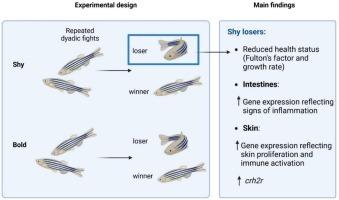Personality and repeated social defeat affect health condition and gene expression in the skin and intestines in zebrafish
IF 3.9
2区 医学
Q1 CLINICAL NEUROLOGY
Progress in Neuro-Psychopharmacology & Biological Psychiatry
Pub Date : 2025-10-02
DOI:10.1016/j.pnpbp.2025.111487
引用次数: 0
Abstract
Personality traits and acquired experience affect the capacity of an individual to cope with environmental and social changes. Behavioural adaptation and physiological alterations are important to prepare the body for these potential challenges. Whether inherited traits or acquired social rank (reflecting stress levels) are more important and how different personality-social rank combinations affect an individual's health is not well understood. One important aspect of health status is the function of biological barriers, as they represent the first line of defence of an organism. In the current study, we used a model of social defeat stress applied to a bold and a shy line of zebrafish. The Fulton's condition factor was determined, and gene expression analysis was performed on skin and intestines. The differences between lines explained a major part of the transcriptional changes observed as compared to differences in social rank. Additionally, shy fish that experienced repeated social defeat presented a poor body condition, accompanied by changes in gene expression suggesting inflammation in the gut. In the skin, shy fish showed a transcriptional enrichment of pathways related to cell division as well as increased expression of the stress response-associated gene crh2r. Together, these results complement our previous work and show that shy loser fish experience important changes not only in behaviour but also in their biological barriers, potentially putting their overall health at higher risk.

个性和反复的社会失败影响斑马鱼的健康状况和皮肤和肠道中的基因表达。
性格特征和获得的经验影响个人应对环境和社会变化的能力。行为适应和生理改变对于让身体为这些潜在的挑战做好准备是很重要的。遗传特征还是后天社会地位(反映压力水平)更重要,而不同的人格-社会地位组合如何影响个体的健康,目前还没有得到很好的理解。健康状况的一个重要方面是生物屏障的功能,因为它们是生物体的第一道防线。在目前的研究中,我们使用了一个社会失败压力模型,应用于一个大胆和害羞的斑马鱼系。测定富尔顿病因子,并对皮肤和肠道进行基因表达分析。与社会等级的差异相比,两行之间的差异解释了观察到的转录变化的主要部分。此外,经历多次社交失败的害羞鱼表现出较差的身体状况,并伴有基因表达的变化,表明肠道炎症。在皮肤中,害羞鱼表现出细胞分裂相关途径的转录富集以及应激反应相关基因crh2r的表达增加。总之,这些结果补充了我们之前的工作,并表明害羞的失败者鱼不仅在行为上经历了重要的变化,而且在它们的生物屏障上也经历了重要的变化,这可能使它们的整体健康处于更高的风险之中。
本文章由计算机程序翻译,如有差异,请以英文原文为准。
求助全文
约1分钟内获得全文
求助全文
来源期刊
CiteScore
12.00
自引率
1.80%
发文量
153
审稿时长
56 days
期刊介绍:
Progress in Neuro-Psychopharmacology & Biological Psychiatry is an international and multidisciplinary journal which aims to ensure the rapid publication of authoritative reviews and research papers dealing with experimental and clinical aspects of neuro-psychopharmacology and biological psychiatry. Issues of the journal are regularly devoted wholly in or in part to a topical subject.
Progress in Neuro-Psychopharmacology & Biological Psychiatry does not publish work on the actions of biological extracts unless the pharmacological active molecular substrate and/or specific receptor binding properties of the extract compounds are elucidated.

 求助内容:
求助内容: 应助结果提醒方式:
应助结果提醒方式:


